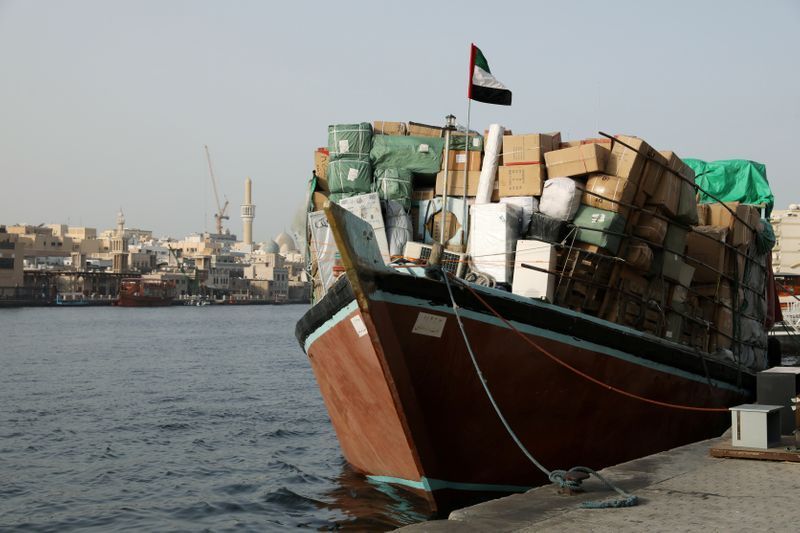
FRANKFURT/LONDON (Reuters) -Germany, France and Britain urged the Trump administration in late October to reconsider broad, new sanctions against Iran’s banks, arguing that the move would deter legitimate humanitarian trade and hurt the allies’ common interests, diplomatic correspondence shows.
Germany’s Bundesbank also kept a multi-billion-euro deposit facility open for Iranian banks, including two that faced fresh US sanctions, giving Tehran a much-needed banking lifeline at a time its access to the global financial system was largely cut off, according to central bank data and interviews with bankers, Western diplomats and officials.
The behind-the-scenes pushback to Washington and the extent of Germany’s support to Iranian trade in the face of US sanctions have not been previously reported, and shed new light on the divergent approaches to Iran taken by President Donald Trump and the US allies.
The letter came after the United States imposed sanctions on October 8 against 18 Iranian banks as part of a campaign to exert “maximum pressure” on Tehran. The order barred Americans further from dealing with the Iranian banks and extended secondary sanctions on foreign companies that did business with those lenders. For foreign banks, violations could mean losing access to the US market and raise the spectre of hefty penalties, even although US sanctions, legally speaking, don’t apply in Europe and other jurisdictions.
In their joint letter, dated October 26, diplomats from the three European nations told Washington that the sanctions could make food and medicine “prohibitively expensive” for ordinary Iranians in the middle of the pandemic.
“The US has always said that its aim was to target the ruling elite and not the Iranian population,” according to the letter, a copy of which was seen by Reuters. “In our view it is important to uphold this undertaking in practice.”
They sought reassurances that the United States would “not impose penalties on financial institutions processing humanitarian trade in good faith without first engaging with them.”
In a statement to Reuters, the US State Department said that Washington wants to ensure sanctions do not impede humanitarian assistance to respond to the COVID-19 pandemic.
A spokesperson with Britain’s Foreign, Commonwealth and Development Office said the UK “does not agree with these sanctions, which affect a number of banks helping the Iranian people access vital humanitarian supplies.”
France’s foreign ministry declined to comment. A French diplomatic source said the letter was part of ongoing efforts by the three countries to make clear to the US administration that it would not give up on the Iran deal.
A German government official said that humanitarian channels need to remain open and that it has advocated for this.
A Bundesbank spokesman confirmed that Iranian banks held accounts with it in order to process payments but declined to comment on them individually. “The German Bundesbank is bound by national and European law, also, naturally, in relation to financial sanctions,” the spokesman said.
The Iranian government did not immediately respond to requests for comment.
IRAN NUCLEAR DEAL
The Iran nuclear accord of 2015 was a key achievement for President Barack Obama’s international diplomacy until Trump withdrew from the deal in May 2018, and started imposing a new round of unilateral sanctions on Tehran.
Financial support for trade, one of the central tenets of the agreement, has since shrivelled, hitting Iran’s economy hard. The Institute of International Finance, a global group of financial institutions, estimates that the Iranian economy contracted by about six percent for the third consecutive year because of the impact of sanctions and the coronavirus pandemic.
Tehran, meanwhile, has cited the general absence of financial support from European powers as a reason for ignoring parts of the nuclear deal. Ratcheting tensions further, the country’s top nuclear scientist was assassinated in recent days.
Germany, France and Britain, which were also signatories to the 2015 deal, are hoping President-elect Joe Biden would change course. Biden, set to take office on January 20, has said he will re-join the pact if Iran resumes compliance.
One European diplomat said that Germany was now leading preparations to salvage the deal. The foreign ministers of Germany, France and Britain met in Berlin at the end of November to discuss Iran in a meeting France’s foreign ministry said was aimed at preserving the nuclear deal.
German lawmaker Klaus Ernst told Reuters that Berlin was keen that trade was revived.
“Europe needs to win its independence from America when making international payments,” said Ernst, who chairs the Bundestag’s economy and energy committee. “Trade is the best way of getting Iran to change for the better.”
BUNDESBANK DEPOSITS
Germany’s political position, informed by historical ties with Iran, has helped its banks and companies play a leading role in trade with Iran, according to two experts in international payments.
Justine Walker, head of global sanctions and risk with ACAMS, an organization of specialists tackling financial crime, said Germany stood out for its willingness to hold Iranian accounts – a stance that has continued despite the US sanctions.
Five Iranian banks – all of which are subject to US sanctions – held roughly 3.8 billion euros on deposit with the Bundesbank at the beginning of the year, according to the banks’ financial accounts. Some of this money has since been withdrawn, but the level of financial exposure is still above three billion euros, Bank for International Settlements data from June shows.
US officials have raised concerns about these Bundesbank accounts in conversations with their German peers in recent years, one US official, who asked not to be named, told Reuters.
The funds are used by the Iranian banks to facilitate transactions to companies doing business with Iran, according to two finance sources with direct knowledge of the matter.
Reuters could not learn how long these payment facilities for Tehran have existed.
One of these banks is the German unit of Iranian state-owned Bank Melli, which was sanctioned in 2018.
Helmut Gottlieb, a board member and top manager at the bank, said although the scope of the bank’s activities had narrowed, it still offered loans to companies that do business with Iran.
“Under Trump, we’ve come under increasing pressure from the Americans,” Gottlieb said. He added that the Melli’s German unit is regularly audited and must meet standards set by Bundesbank and other European regulators.
COMMON INTERESTS
One of the banks with an account with the Bundesbank is mentioned in the October letter. The bank is among a handful that the Europeans singled out as worthy of exemption from secondary sanctions because of their focus on financing humanitarian trade and proven record of compliance.
The European allies make a broad plea for leniency, however, the letter shows. They argue against cutting off the sanctioned banks’ access to the SWIFT payment messaging system and express worries about the impact on Instex, a fledgling mechanism set up to barter humanitarian goods and food with Iran.
They also argued that the sanctions would make it more difficult for diplomatic missions, international organizations and non-profits to maintain their presence in Iran.
“The humanitarian needs of the Iranian population are acute and require an effective response. Actively hindering such a response will damage our common interests,” they wrote.




